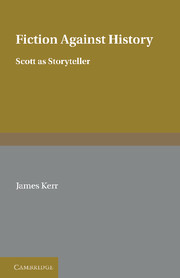Book contents
- Frontmatter
- Contents
- Acknowledgements
- A note on citations of the Waverley novels
- 1 The historical novel and the production of the past
- 2 The reemplotment of rebellion: Waverley and Old Mortality
- 3 Historical fable and political fantasy: The Heart of Midlothian and The Bride of Lammermoor
- 4 Redgauntlet: the historical romance as metafiction
- Notes
- Index
1 - The historical novel and the production of the past
Published online by Cambridge University Press: 28 January 2010
- Frontmatter
- Contents
- Acknowledgements
- A note on citations of the Waverley novels
- 1 The historical novel and the production of the past
- 2 The reemplotment of rebellion: Waverley and Old Mortality
- 3 Historical fable and political fantasy: The Heart of Midlothian and The Bride of Lammermoor
- 4 Redgauntlet: the historical romance as metafiction
- Notes
- Index
Summary
My subject is Walter Scott the storyteller, the romancer who forged illusions of the past from an admixture of literary form and historical record, and the historian who used the logics of literary form as instruments for understanding the past. Storyteller and historiographer, Scott constructed his fictional project around the relationship between the language of fiction and historical reality, the possibility of grasping the movements of history in the language of fiction, and the denial of that possibility. Conscious of the fictionality of his narratives, he deliberately played fiction and history off against one another, not only as “artifice” against “reality,” but as codified forms of written discourse. “Fiction” and “history” are verbal worlds for Scott, forms of understanding that appear at one moment radically disparate, at another virtually indistinguishable. This is where the complexity of the Waverley novels is to be sought, in the interaction of fiction and history.
In the Waverley novels, the mixed genre of historical romance becomes a field in which perceived contradictions in history can be recreated and resolved. It is a zone of freedom, a verbal realm apart from history, the limits of which are prescribed by the taleteller's imagination, where the ugly facts history throws in the way of the writer can be made into appealing, or at least consoling, stories about the past. For Scott, the facts of the past are the stuff of tales. Yet they serve not only as the raw material of his fiction, but as its justification as well.
- Type
- Chapter
- Information
- Fiction against HistoryScott as Storyteller, pp. 1 - 17Publisher: Cambridge University PressPrint publication year: 1989

